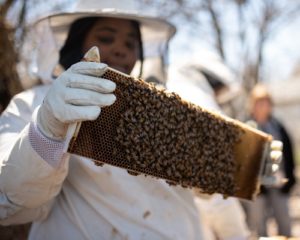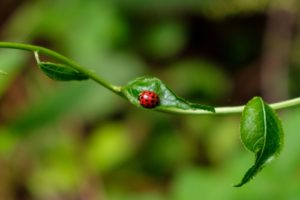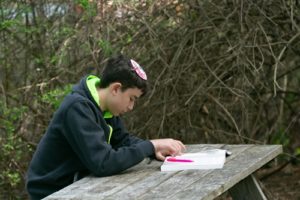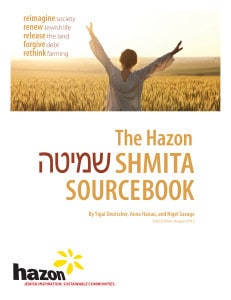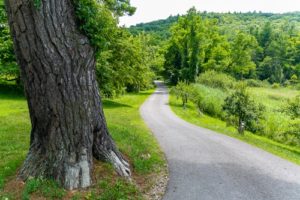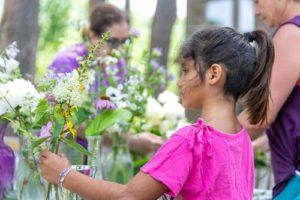Hazon Educational Library: nature
Jewish Food for Thought: Caring for Pollinators
by Beth Denaburg
Shoresh
The series of programs focuses on the interconnections between Judaism, nature, and food - aiming to explore the threads of interconnectedness that bind people, plants, pollinators, soil, and Jewish traditions.
Age(s): Youth
Hakarat Hatov
by Molly Sease
Milk and Honey Farm
This program is an exploration of the Jewish concept of hakarat hatov, or ?noticing the good?, understanding and expressing appreciation for all life and experiences in the garden or farm.
Category: Animals, Nature Exploration
Age(s): Youth
Shalom Institute Toddler Family Camp: Sukkot Style!
by Allison Blonder
Shalom Institute
Experience the magic of Jewish summer camp with your family! Enjoy action-packed (or leisurely) days and nights to create a lifetime of memories together. Celebrate Shabbat with the JCA community, learn more about Sukkot, enjoy an unplugged weekend in nature, and enjoy activities centered around the values of Kehilla (community) and Shomrei Adamah (keepers of the Earth).
Age(s): Families
It?s All About Perspective: What Kind of Spy Are You?
by Sara Just-Michael
Grow Torah
This program is designed to have students deepen their connection with nature by looking at all the details and empowering them to use their positive brain instead of their negative brain. Participants will also have a greater understanding and connection to the story of the Jewish peoples first look into Israel.
Category: Nature Exploration
Age(s): Young Adult, Youth
Passover on the Farm
by Molly Sease
Milk and Honey Farm
This program was designed for families with young children to connect with each other, their community, and the earth through multi-sensory activities centered around Passover and the coming of spring.
Age(s): Early Childhood with Parents
Shmita Sourcebook
by Yigal Deutscher, Anna Hanau, and Nigel Savage
Hazon
The Shmita Sourcebook is designed to encourage participants to think critically about the Shmita Cycle – its values, challenges, and opportunities – and how this tradition might be applied in a modern context to support building healthier and more sustainable Jewish communities today.The Shmita Sourcebook is a 120-page sourcebook that draws on a range of texts from within Jewish tradition and time, tracing the development and evolution of Shmita from biblical, historical, rabbinic, and contemporary perspectives.
Tu B’Shvat Family Nature Hike
by Jared Kaminsky
Shoresh
This program is an opportunity for families to celebrate Tu B'Shvat through learning about local ecology, connecting to nature, and understanding the essence of this Jewish holiday on a community hike.
Age(s): Families
Moon Qweens: Eim/Mother
by Leora Cockrell
Camp Tawonga
This curriculum is part of four-part elective (aka Chugim) titled Moon Qweens. The overall purpose of the elective is to introduce campers to female and feminine spirituality, archetypes, leadership styles, and divinity in Judaism and beyond. Through this introduction, campers may feel better able to relate to Judaism and to see the connections between spirituality, care for the earth, and care for our bodies.
Age(s): B'nai Mitvzah
Mindfulness Nature Walk
by Jared Kaminsky
Shoresh
This program will help participants develop their ability to be more mindful and aware drawing on Jewish teachings while in nature. Participants will learn how to approach the natural world from a place of curiosity, and awareness helping to improve themselves and the planet.
Age(s): Young Adults
Ancient Garden Medicinal Herbs
by Leora Cockrell
Camp Tawonga
This program is an introduction to the history and uses of medicinal herbs growing in the Camp Tawonga Garden. Participants will learn about how medicinal herbs connect to self-care and earth-care. Participants will learn about the healing properties of twelve medicinal herbs as well as their cultural and historic uses: Israeli, Mediterranean, Jewish and Native American. Participants will be given the opportunity to and think about what it means to connect both to their herbal heritage as well as the medicinal herbs that grow natively on this land.
Age(s): B'nai Mitzvah, Teens
Tu B’Shvat Youth Seders
by Daniella Aboody
Wilderness Torah
In the tradition of the Kabbalists (16th century mystics of Tsfat, Israel), we gather in the forest to create an experiential Tu B'Shvat seder (ceremony) that connects us to the trees and the elements, and we are taken on a journey from the physical world to the spiritual world. This oral tradition within Judaism encourages us to open ourselves to the mystery, wonder and creativity that this time of renewal and rebirth brings. During the seder, we delight in experiencing and tasting of p'ri ha-etz (the fruit of the trees) and celebrate the season together through the five senses, movement, mindfulness, ritual, and Tu B'Shvat teachings.
Age(s): Early Childhood

